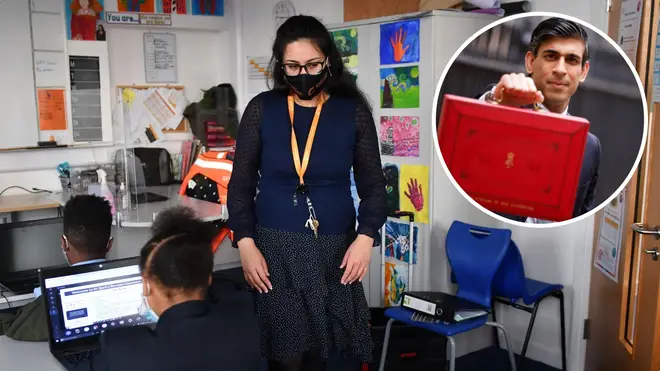
Paul Brand 3pm - 6pm
25 October 2021, 22:32 | Updated: 25 October 2021, 22:46

Rishi Sunak is due to announce that the year-long public sector pay freeze is to end, paving the way for millions of workers to receive a pay rise.
Chancellor Rishi Sunak is set to lift the public sector pay freeze as part of his budget review on Wednesday, meaning more than five million public sector workers could benefit from a pay rise next year.
The pay freeze was introduced by the Chancellor back in November of 2020 to balance the books - after he announced a £2.9 billion programme to boost jobs following the chaos caused by the coronavirus pandemic.
The public sector pay restraint meant wages for more than four million workers were capped or frozen altogether, with only frontline NHS doctors and nurses exempt.
Firefighters, teachers, the armed forces, police, civil servants, council and Government agency staff were all affected by the controversial pay freeze.
Read more: Cost of Covid: Public sector pay freeze as Sunak declares 'economic emergency'
Read more: Police Federation tells LBC a pay freeze by Rishi Sunak would be a ‘slap in the face’

Nick Ferrari confronts Chancellor over NHS pay freeze during Covid
On Wednesday Mr Sunak will announce an ed to the one-year pay pause, when he reveals the Government's spending plans for the year.
The Treasury says this is possible due to the solid recovery of the economy and encouraging signs in the labour market.
Mr Sunak said the "difficult decision" to pause public sector pay was a result of the economic impact and "uncertainty of the virus".
"Along with our Plan for Jobs, this action helped us protect livelihoods at the height of the pandemic," he said.
"And now, with the economy firmly back on track, it’s right that nurses, teachers and all the other public sector workers who played their part during the pandemic see their wages rise."
The temporary pause proved controversial among the affected sectors.
Read more: Budget 2021: What can we expect from the Chancellor?
Read more: Budget 2021: Chancellor to announce £3bn investment in skills and education

Ché Donald brands pay freeze a 'slap in the face'
Vice-chair of the Police Federation told LBC’s Swarbrick on Sunday that a public sector pay freeze was a “slap in the face” for officers who served during the pandemic.
However, the Treasury said the decision helped "protect jobs at a time of crisis during the pandemic", while it also ensured the gap between public and private sector pay did not widen further.
Trade Union Congress (TUC) general secretary Frances O'Grady had called on ministers to use the autumn Spending Review to end the public sector pay freeze and give frontline workers a pay rise.
Ms O'Grady made the demand earlier this month after research by the TUC found one in five key public sector workers had declared they were "actively considering" quitting and changing profession due to complaints about low pay, excessive workloads and feeling undervalued.
The planned increase will depend on the recommendations from the independent Pay Review Bodies, who set the pay for most frontline workforces – including nurses, police officers, prison officers and teachers.
The government will be running a full pay round and the awards will be announced next year once government responds to the pay review bodies’ recommendations.
Read more: National Living Wage 'to be hiked to £9.50'

Rishi Sunak says being 'responsible with the nation's finances' is 'really important' to him
Kevin Courtney, the National Education Union's (NEU) joint general secretary, said: "This is big on promises but short on detail.
"Teachers, support staff and school and college leaders will not have a clear sense this week of what is in store, and there is no prospect of clarity until 2022.
"The Chancellor must do more than win a day's headlines.
"He must make good on this latest pledge to drive up pay for those who kept this country on its feet throughout the pandemic."
The news comes as it was confirmed on Monday that the UK’s lowest-paid workers will receive a pay rise next year as the National Living Wage increases from £8.91 to £9.50 an hour.
It will see the hourly rate for employees aged over 23 rise by 59p an hour, meaning the annual income of full-time workers on the living wage would jump by more than £1,000.
The 6.6 per cent increase will amount to more than twice the current consumer price inflation rate of 3.1 per cent.
Young people and apprentices will also see their wages boosted from April 1, as the National Minimum Wage for people aged 21-22 goes up to £9.18 an hour and Apprentice Rate increases to £4.81 an hour.
The Chancellor is expected to confirm the rise at Wednesday’s Budget and Spending Review.